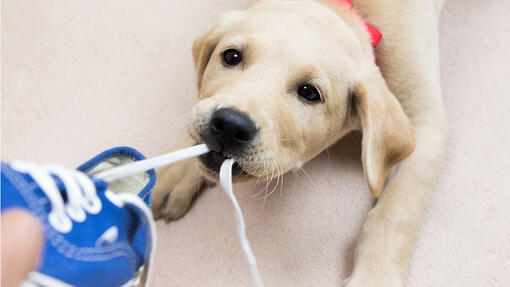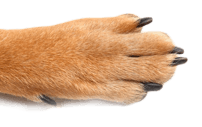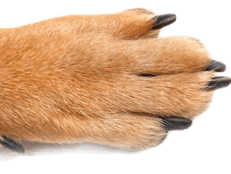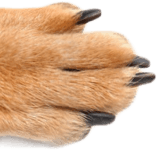
Find out how to stop your puppy from play biting by learning why they do this and how you can make games and interactions with your puppy bite free.
While play biting often hurts, it is important to remember that this isn't your puppy being aggressive in any way - it is just that they are still a baby, and they have limited ways to play with your dog and interact. Up until now, all of their games with their littermates and their mum have involved teeth and biting - so this is what they think play is.
Play isn't just for fun either - it is a great social, bonding exercise. Now your puppy is part of your family, they want to bond and be social with you, and they only know one way to do that. With teeth!
So, while those needle-sharp puppy teeth hurt, it's important to understand why they are biting, and start to teach them that playing and interacting with humans has to be done tooth-free.
Why is my puppy biting me?
Puppy biting behaviour is an important life stage that teaches them how to use their teeth appropriately.
Play and social bonding
When a puppy is with their littermates and their mum, all games and social interactions involve biting. That is the only way they have to play at that age - and so they expect that is the way you will want to play too.
Adult dogs have 42 teeth and strong jaws - these are needed to gnaw, chew and digest their food. In contrast, the 28 puppy teeth are needle-sharp and their jaws are weak. This means that while bites hurt, they don't cause injury, and this helps them to learn bite-inhibition from their littermates and their mum so that they learn how to use those adult teeth appropriately in social interactions.
When puppies in a litter play together, this play will involve lots of rough and tumble and play-biting. This is how puppies learn to interact with each other and also how to limit their biting. If they bite too hard or the play gets too rough, the other puppies or their mother will stop playing with them, so they learn that if they want the games and the fun to continue, they have to be more careful with their teeth. This teaches them a valuable lesson about appropriate interactions with others.
Some dog breeds or types will bite more - or at least be more mouth-focussed. Many of our more popular breeds are gundogs of gundog crosses, and many of those were developed to bring things back in their mouth - so as puppies, everything goes in their mouth! Others we developed to have lightning-fast reactions and to grab things.
Teething
Just like human babies, dogs will go through a period of teething when their baby teeth fall out and they get their permanent teeth. This causes sore gums and mouth which often exacerbates biting.
Excitement biting
It is easy for puppies to get overly excited - especially if you play rough games with them. Puppies don't have many ways to deal with this excitement and arousal - and so biting is an almost sure-fire result.
Overtired biting
Just like fractious toddlers, an overtired puppy is often a fractious and bitey puppy. Puppies need far more sleep than most people realise - an eight-week-old puppy needs to sleep for around 20 hours a day! Not only will this reduce a lot of their biting behaviour, it will also help them learn better too.
Schedule nap times into your puppy's day to make sure they are getting their beauty sleep.
Frustration
Puppies can bite when they are frustrated too - so if they are not getting what they want or sometimes if you are preventing them from doing something, that frustration can lead them to bite.
How to Stop Puppy Play Biting
To teach your puppy not to bite and to behave appropriately you need to use gentle, positive reinforcement. This means that you encourage your puppy to do the things you want them to do and reward them when they do so it becomes their new default behaviour.
Importantly, you are always looking to put your puppy in situations where they will behave the way you want them to - so you can reward that good behaviour. When it comes to biting, it is often about recognising and removing the triggers that you know will encourage your puppy to get toothy.
What to do when puppies bite
Even with your best intentions, your puppy will occasionally nip you hard enough that it hurts. First of all, don't over-react. Yes, it may have hurt but if you tell your puppy off, get annoyed or shout at them, you will make them scared of you, lead them to mistrust your hands, and it will break down the relationship you have. In some puppies, it will encourage them to bite more!
Instead, you have several options and the option(s) you choose will depend on your puppy's character, breed/type, and their individual nature so it is a bit of trial and error to find out what works best for your puppy.
- If it was a one-off accident, ignore it and carry on playing. Everyone makes mistakes.
- If it continues, deflect their need to bite onto an appropriate toy - so they learn what they can gnaw at and what they can't.
- If this doesn't work and your puppy is intent on biting you, stop playing and turn away from your puppy for 10 seconds so they know that if they use their teeth, the fun stops. This way they learn that if they want to play with you, they can't use teeth.
- When you return to play, continue to play with a toy that your puppy can bite instead.
- If the play biting continues, remove yourself totally from the game for a minute so your puppy knows that if they bite, you really will stop the game and will take away your presence.
- Don't do this for any longer than a minute and don't leave the room, and then when you come back to your puppy, carry on as before. Dogs don't hold grudges and neither should you.
- Sometimes play-biting happens because the puppy is frustrated, has too much energy or conversely isn't getting enough sleep. Make sure they are getting enough positive interactions, problem-solving brain games, lots of chances to succeed and lots of opportunities for good quality undisturbed sleep.
- Make sure they have plenty of opportunities to chew appropriate things - dogs not only need to chew and gnaw, but it is a stress-reliever for them
- Make sure everyone in the household does the same thing. The puppy will just get confused if one person lets them bite and the others don't.
- Supervise all interactions between your puppy and children (or any visitors or members of your family who will encourage rough games) to ensure that play doesn't get too boisterous and to prevent play-biting mistakes. If you can't supervise, use baby gates and play pens to keep them separate.
- Puppies will teethe the same way as babies from around 12 weeks old up to about six months of age sometimes longer. Gradually their baby teeth will fall out to be replaced by their adult teeth. At this time, they may have some discomfort from sore gums and teeth and may need to chew more than usual. Make sure you have safe toys that they can gnaw on, both to distract them from chewing furniture or hands, and to help relieve them from any discomfort they may be feeling. There are even some puppy teething toys you can buy that can be put in the fridge to help cool sore gums.
Never punish your puppy verbally or physically. You will just make them fearful of you, it will damage your relationship, and it will not have the effect you desire and can make biting behaviours worse.
How to prevent puppy biting?
Now you know what to do when your puppy bites, but can you prevent it?
When your puppy comes home with you and is living in a human family, they need to be taught that games with humans don't include teeth! You don't want puppy biting to be a continued behaviour into adulthood when they are armed with a full set of adult teeth, but you do want to teach them appropriate ways for you to play and have fun together.
Don't play rough with your hands
Don't ever play rough games with your puppy or push them around with your hands, this is just encouraging them to use their teeth to grab at you. Teach them from the very start of your life together that your hands aren't for playing with.
Teach puppies that hands are good things
All interactions with your hands should be gentle and soothing; stroking, ear rubs, back-scratching etc. Your puppy should learn that your hands are good things and not tug toys or dog chews.
Games of tug do not include hands
For gentle games of tug, use toys that keep your hands away from puppy teeth. Again, if they do bite your hands, redirect their attention to their toy or find and longer one or one with a rope.
How to stop mouthing in puppies and adults
There is a big difference between play biting and mouthing. Mouthing doesn't usually hurt - as long as it doesn't get overly-enthusiastic - and some dogs (especially some gundogs - whose jobs are all about carrying and holding things so can be rather mouth-focussed) will naturally play this way. While some owners don't mind this, it can be a bit slobbery and while it isn't painful, some people don't like it (especially when wearing nice clothes!) - and if you have children or vulnerable adults in the house, you definitely don't want teeth anywhere near skin at all. Also, some dogs can start off by playing and then get over-aroused and gentle mouthing can turn into something harder and more painful.
- Understand why your puppy or dog is mouthing.
This usually starts off as play and as a way to interact with you in dogs who are mouth-focussed. - Avoid overreacting to mouthing
While you might not be happy about having your dog's mouth around your hand or arm, remember they are playing - or possibly trying to get your attention. Telling them off, shouting at them, or physically punishing them isn't appropriate - and could well damage the bond you have with your dog - or turn happy, playful mouthing into using their teeth more seriously in fear or surprise. - Don't make it a game
While you might know your puppy or dog is playing, this isn't a game to encourage. Stop the game, don't react - and give a clear signal that they don't play that way with humans. Make sure everyone in the family does the same. - Distract your dog
Redirecting your dog's attention to something else when they get the urge to mouth something is a great way to teach them that there are some things that can be mouthed and some things that shouldn't - and people come firmly into the latter category. Having their favourite toy nearby, ready to give to them when they're mouthing will help you distract them successfully. Changing play to something incompatible with mouthing by re-directing their nose, mouth and teeth somewhere else in a low energy exercise can be invaluable - such as a scent game or a problem-solving exercise - as this will still be rewarding play and interaction but without teeth. - Don't play over-arousing games with your dog.
Often over-arousal or excitement will often lead dogs to use their mouths - as they don't have that make ways to play! Especially don't play over-arousing games using your hands (such as pushing or shoving them about). Also don't grab them or treat them roughly - as you can hardly blame them if they respond in kind! - Reward your dog's good behaviour
Make sure you reward your dog when they are playing without using teeth. Be encouraging when they are playing with you with tuggy toys or things they can bite and chew that aren't hands. - Give your dog lots of play and games with you that are low energy but use their brain.
Understanding why puppies bite - and how natural it is - helps you prevent situations where it is likely to occur, and how to deal with it appropriately when it does.
If at any point, you are concerned with your puppy or dog's biting, contact an accredited behaviourist immediately - especially if you have children or vulnerable adults in the house or if your dog has caused injury.




